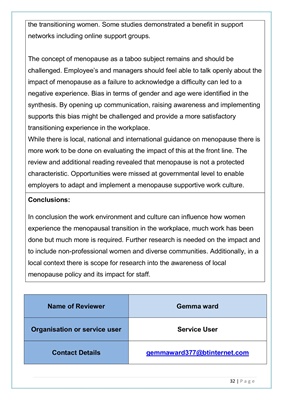
32 | P a g e
the transitioning women. Some studies demonstrated a benefit in support
networks including online support groups.
The concept of menopause as a taboo subject remains and should be
challenged. Employee's and managers should feel able to talk openly about the
impact of menopause as a failure to acknowledge a difficulty can led to a
negative experience. Bias in terms of gender and age were identified in the
synthesis. By opening up communication, raising awareness and implementing
supports this bias might be challenged and provide a more satisfactory
transitioning experience in the workplace.
While there is local, national and international guidance on menopause there is
more work to be done on evaluating the impact of this at the front line. The
review and additional reading revealed that menopause is not a protected
characteristic. Opportunities were missed at governmental level to enable
employers to adapt and implement a menopause supportive work culture.
Conclusions:
In conclusion the work environment and culture can influence how women
experience the menopausal transition in the workplace, much work has been
done but much more is required. Further research is needed on the impact and
to include non-professional women and diverse communities. Additionally, in a
local context there is scope for research into the awareness of local
menopause policy and its impact for staff.
Name of Reviewer
Gemma ward
Organisation or service user
Service User
Contact Details
gemmaward377@btinternet.com